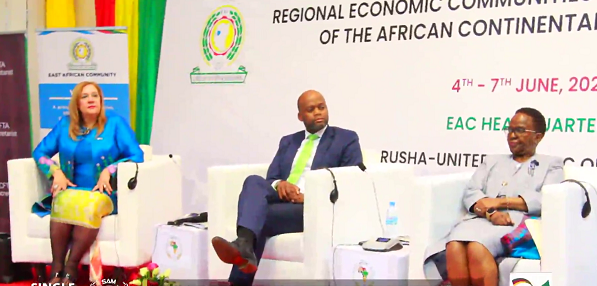The Secretary-General of the AfCFTA secretariat, Wamkele Mene, has addressed the second regional coordination meeting of heads of regional economic communities (RECs) on implementation of the continental free trade area, in Arusha, Tanzania.
He emphasised that the secretariat aims to commence commercially meaningful trading under the AfCFTA very soon.
“This challenge of implementing the AfCFTA is on all of us – the regional economic communities, the secretariat as well as the private sector. Those who came before us played their role by liberating our continent, and it’s now up to us to continue the journey that they started.”
Minister of Foreign Affairs and East African Cooperation of the United Republic of Tanzania, Liberata Mulamula, urged Africans to connect their infrastructure in order to effectively trade among themselves.
“We need to take this as a package, and not ‘either or’, for us to succeed and be able to achieve the vision of the Africa we want with the right connectivity. We have all that it takes as a continent to realise this agenda,” she noted.
Relatedly, the AfCFTA boss furthered engaged Lesotho’s prime minister when he pledged that the secretariat will continue working with the government of Lesotho to ensure its smooth participation in the single continental market.
“We will ensure that Lesotho sees the benefits of this agreement – to the extent that in some of the priority areas where Lesotho is already exporting, for example under AGOA, they’ll have opportunity to export across the African continent as well,” he indicated.
Young logisticians deploy innovation to transform logistics and supply sector amid AfCFTA
The Chartered Institute of Logistics and Transport CILT) Youth Wing say they have identified numerous opportunities to explore under the free continental market, and are encouraging young logisticians to come up with solutions that will improve the logistics and transport business across the continent, according to Usman Shuaibu, Deputy Global Chairperson-CILT Next Generation.
“We’ve identified a number of areas, as young people, where we can develop and enhance our skills to take advantage of the biggest economy that we can find on the continent now.
“It also helps us to reduce the youths’ interest or aspiration for moving to other parts of the world in search of better opportunities,” he told Single African Market in an exclusive discussion.
Mr. Shuaibu said that CILT is committed to providing some soft skills programmes for members to understand the effect of carrying out research, building data and proposing new solutions which will help to digitalise the logistics business.
An example of such innovations, he indicated, is a project dubbed “One Port 365” that focuses on providing seamless logistics solutions within the continent so people can find within the logistics ecosystem the different checkpoints of interactions with a touch of the screen.
“These innovations will help to reduce inefficiencies in the logistics system and accelerate intra-Africa trade, especially for certain types of goods as most economies are raw-material based.
But we foresee that opportunities might come in the area of short-sea shipping where we can be able to arrange feeder shipping services within neighbouring countries in a click of the button,” Mr. Shuaibu further stated.
The CILT Next Generation deputy global head also urged increased involvement of young people in the deliberations of AfCFTA to get them acquainted to the agreement and to enable them come out with their solutions and contributions.
“We have to see AfCFTA as the new dawn in Africa; there’s no better way of doing things than to look at it from a better perspective and with high optimism.
Young Africans realize that it is better to look at it with an open mind, the boldness and vision to see that we are the actual drivers of this programme and we have to take the maximum advantage of the opportunities that we can see from the single market,” he noted.










